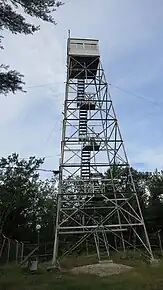Mount Grace
Mount Grace, 1,617 feet (493 m), is a prominent monadnock located in north central Massachusetts in the town of Warwick, approximately two miles south of the New Hampshire border. The mountain is rugged and largely wooded, but a firetower on the summit provides expansive views of the surrounding rural countryside. Little Mount Grace, 1,226 feet (374 m), is the southern summit of the mountain. Mount Grace supports a predominantly northern hardwood forest as well as stands of red spruce near its summit.[1]
| Mount Grace | |
|---|---|
 View from Mount Grace firetower; Mount Monadnock visible in the distance | |
| Highest point | |
| Elevation | 1,617 ft (493 m) |
| Prominence | 682 ft (208 m) |
| Coordinates | 42°41′28″N 72°21′18″W |
| Geography | |
| Location | Warwick, Massachusetts. |
| Parent range | Upland plateau of central Massachusetts |
| Geology | |
| Age of rock | 400 million yrs. |
| Mountain type | monadnock; metamorphic rock |
| Climbing | |
| Easiest route | Metacomet-Monadnock Trail |
The north side of Mount Grace drains into the Ashuelot River, thence into the Connecticut River, then Long Island Sound; the west side drains into the Connecticut River via Mill Brook; and the south and east sides drain into the Millers River, thence into the Connecticut River.[2]
History
Mount Grace is named after Grace (Sarah) Rowlandson, the daughter of Mary Rowlandson, a Puritan colonist of Massachusetts. Grace (Sarah) died after she and her mother were captured by Native Americans of the Narragansett Tribe during King Philip's War in 1676.[3] The story that Mt. Grace is named after Mary Rowlandson's daughter named "Grace" and that her daughter is buried at Mt. Grace is a touching folktale, but it is not true. Mary's narrative names that her daughter is Sarah, not Grace. Sarah Rowlandson (not named Grace) is recorded in the Vital Records of Lancaster (p 12), born 15 Sept 1669, as named Sarah at birth. Mary's Narrative records that Sarah died at the Native encampment along the Ware River in New Braintree known as Menimesit or Wenimessett. Citation: "Narrative of the Captivity and Restoration of Mary Rowlandson," written by Mary Rowlandson in 1682, edited by Henry Stedman Nourse, reprint 1953, footnotes on page 13. There is a memorial stone for Sarah in North Cemetery in New Braintree, near the former site of the Native encampment.
Picnic area
In the 1930s, the Civilian Conservation Corps built a picnic area on the west side of Route 78, at the bottom of the mountain, below the Gulch. The banks of the brook were walled with stone. The Corps also built a picnic area with stone fireplaces and grills, and road access to it. The hardwoods were thinned out, leaving only the White Pines.
In the 1980s, the State ceased maintaining the picnic area. Brush grew up. The area started the transition back to forest. By the late 1990s many of the big White Pines were dead. The State logged the area, and left the slash on the ground to help new trees grow.
The summit also has a small picnic area.
Recreation and conservation
Mount Grace is located within the 1,458-acre (590 ha) Mount Grace State Forest. Hiking, backpacking, hunting, horseback riding, cross-country skiing, mountain biking, and snowshoeing are enjoyed on the mountain.[3] The 114 mile (183 km) Metacomet-Monadnock Trail traverses the summit. A lean-to on the east side of the mountain is available for primitive camping.[1]
In 2000, Mount Grace was included in a study by the National Park Service for possible inclusion in a new National Scenic Trail; tentatively in 2007 the project was on course to be called the New England National Scenic Trail, which would include the Metacomet-Monadnock Trail in Massachusetts, and the Mattabesett and Metacomet trails in Connecticut.[4] In 2009 President Obama signed a bill making the M & M Trail part of the National Scenic Trail system.
The Mount Grace Land Conservation Trust, active in the area, takes its name from Mount Grace.[5]
Warwick Fire Tower

Warwick Fire Tower is a fire lookout tower on the summit of the mountain. The first Warwick Fire Tower was a 40’ iron windmill type tower with a ladder and 6’x6’ cab built in 1911. It was replaced in 1920 with a 68’ iron tower that served until blown down by the 1938 hurricane. The present 68’ steel tower with 10’x10’ wooden cab was constructed in 1939.[6] In spring of 2010, the fire tower was completely rehabilitated. It remains in service as an active state tower. It is staffed from March–May, and late August–October depending on fire danger. In 2004 this tower was listed on the National Historic Lookout Register as US 628, MA 39.
References
- The Metacomet-Monadnock Trail Guide. 9th Edition. The Appalachian Mountain Club. Amherst, Massachusetts, 1999
- DeLorme Topo 6.0 Mapping software. DeLorme, Yarmouth, Maine.
- "Mount Grace State Forest". Energy and Environmental Affairs. Commonwealth of Massachusetts. Retrieved 2014-03-15.
- "Monadnock, Metacoment, Mattabesett National Scenic Trail Study". Archived from the original on 2007-10-08. Retrieved 2007-11-04.
- "Mount Grace Land Conservation Trust". Retrieved 2007-12-12.
- "Warwick Fire Tower". National Historic Lookout Register. Retrieved 2014-03-15.
External links
- Mount Grace State Forest at MassParks
- Mount Grace Land Conservation Trust
- Metacomet Monadnock Trail Berkshire Chapter of the Appalachian Mountain Club
- http://www.trailjournals.com/entry.cfm?id=428834